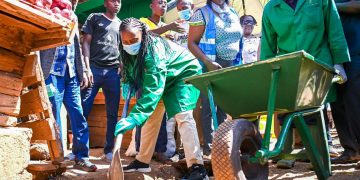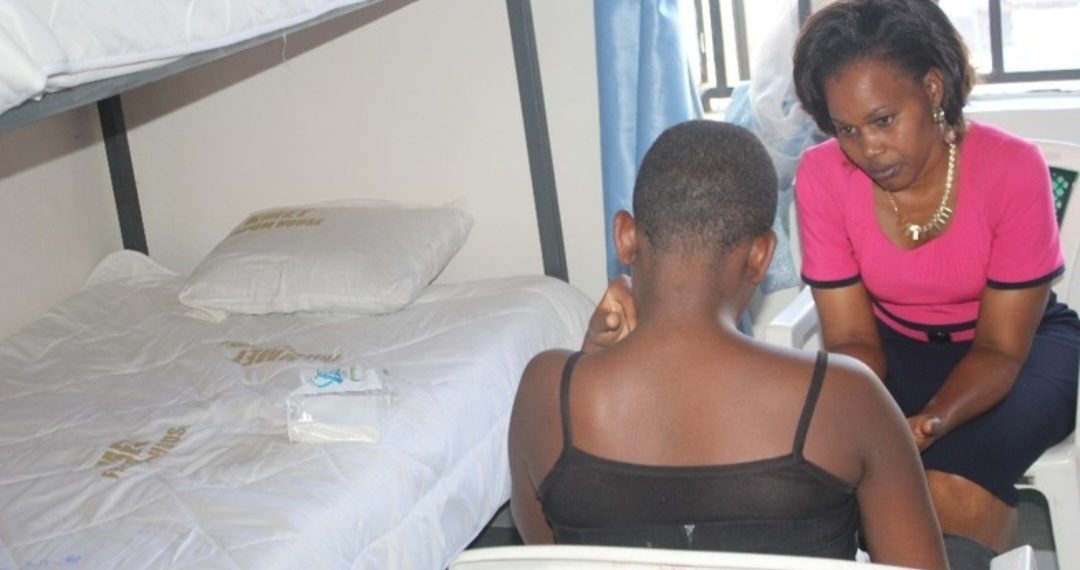Rose (not her real name) is a 9-year-old girl from Kisumu who was rescued by ‘Freedom House’ after being defiled by a close relative.
She makes up the statistics of the over 40 percent of women in the country who have endured Gender based violence according to the latest report by the Kenya Demographic and Health Survey (KDHS).
Distressing statistics show that the number is significantly higher among young girls, who are particularly vulnerable to such violence.
Addressing this issue, a Kisumu-based non-governmental organization (NGO)- Kisumu Medical and Education Trust (KMET)- has established a safe space dubbed ‘Freedom House’ where they save these girls from their abusers.
According to Janepher Omasaba, a Program Associate at KMET, the Freedom House is a temporary holding shelter, where survivors of SGBV receive medical, psychosocial, and legal aid.
The program uses a multi sectoral approach to deal with cases of Sexual and gender-based violence (SGBV) and offers an integrated holistic care for survivors.
“We work closely with the directorate of children department, police, Gender Based Violence Recovery Centre at the Kisumu Jaramogi Oginga Odinga Teaching & Referral Hospital (JOOTRH), trained paralegals, case managers, ministry of health, the ministry of education due to the young age of most of the survivors, and the community gate keepers.”
She adds that, “Freedom House has been in operation since 2017, but closed down due to covid-19 related challenges, it was however relaunched in 2022 with a renewed vigor.”
Through the multisectoral approach, the Freedom House also collaborates with other likeminded partners like the National Shelter Network (NSN) for referral of cases that require further management. The network is platform where shelters interact, exchange knowledge, and strengthen each other’s referral system for survivors of gender-based violence, child labour, forced labour, and other victims of human rights violations.
“Our rescue space is temporary, we host survivors for one month maybe and a month and a half, so we work with other spaces to ensure appropriate placement, for example if we have a pregnant survivor, we refer them to spaces that specifically support pregnant teens,” Janepher says.
“We also offer support in the re-integration of survivors back in the community, making sure that the minors are safe from their abusers and are enrolled back in school.
“Young women past school going age are enrolled in vocational training to equip them with skills that will enable them to support themselves and escape abusive relationships, “she adds.
The Freedom House also conducts community sensitization and dialogues addressing negative and harmful practices, the referral pathways in case of an abuse and how the community can prevent the violations.
Speaking about the 9-year-old survivor, Rose, Janepher demonstrates why it is important to have this network.
“When we rescued her, she was 36 weeks pregnant, and we had to find a facility that would help her deliver safely due to her young age and the multiple complications the pregnancy would present. Through our network we got a partner in Murunga county, a safe space named Kiota Homes that accepted this little girl and met her unique medical needs. Afterwards, she delivered safely and gave up the baby for adoption after which KMET helped her secure school admission.”
In addition to the medical and psychosocial support the organization offers essential legal aid to empower these women to obtain justice.
Speaking on the success of convicting sexual offenders, KMET’s policy and advocacy lead Sharon Amendi noted that they handle the cases that come to the institution pro-bono and since the re-launch of the center every case that was brought to court through the freedom house resulted into a conviction of the perpetrators.
Once a case manager brings in a case to the freedom house, the cases then go through the department that ensures they have all the necessary documentation including the PRC form which shows that an abuse has occurred.
“We are members of the Kisumu SGBV alliance, this is group of CSOs dedicated to managing SGBV and we work with lawyers from the Law Society of Kenya that offer free representation of survivors.”
“In a recent case of a 7-year-old survivor, the court case was finalized in a record 21 days which is relatively fast, the child had been greatly traumatized and had to testify in court, after which a guilty verdict was reached against her abuser, while we wish that Gender based violence as whole did not exist, I consider this a win, these small wins motivate us.”
The biggest challenge of combating sexual abuse is that most cases are not reported, to change this practice KMET through the freedom house has held various community sensitization program as well as set up an emergency toll free line where victims can call to report abuse.
“We have agents manning our lines, they validate the reported case and follow through to the letter, we team up with the police to follow up, we ask the client which community they are from, which village because we also work with chiefs within the various communities after which they are taken straight to the hospital to receive medical attention.”
Some of the SGBV clients are deeply traumatized, some are very young and testifying in court can risk them being traumatized again.
“Sometimes these survivors are so traumatized that they wouldn’t want the prosecutor to question them, in such an instance we make sure they have a friendly face such as their social worker or myself be with them as the prosecutors walks them through their testimonies” says Sharon.
Sharon emphasizes that witness boxes are an important part of protecting the survivors of SGBV from their abusers, with these boxes’ survivors can give their testimonies without coming face to face with their abusers.
“Some courts have no witness boxes, for young survivors facing their abusers in court makes them afraid and can retraumatize them, through the court users committee we are advocating for them so that the survivors can give their testimonies without directly seeing their abusers.”
Another challenge is outside interference, given the vulnerable position of the survivors sometimes they can be bullied not to give their testimony.
“In the instance where we notice an interference from the community, police or even the perpetrator when they are set out free on bail, we either we make sure that a lawyer takes up the case pro bono just to help the case move along faster.”
Most cases in the Kenyan court take a long time before judgement, however Sharon says that it is ideal that SGBV, especially defilement, cases be handled in 6 months to ensure that the survivor gives their testimony as soon as possible to not lose witnesses and to minimize interference.
Since most of the perpetrators are relatives of the survivors who are mostly minors and vulnerable, it has been a challenge getting other relatives to act as witnesses, the minors also face interference and threats from their relatives, abusers and care givers through intimidation and bullying not to open up.
“The level of interference goes very deep that is why we are in the Court Users Committee which is a platform that was launched under the National Council on the Administration of Justice (NCAJ). The appointed members who are from various field like judges, police, witness protection agencies and others work together to stifle these interferences and ensure access to justice for all.”
Since its relaunch in June 2022, freedom house has saved 90 girls from a cycle sexual and gender-based violence, supporting survivors mainly from Kisumu and Vihiga counties.














